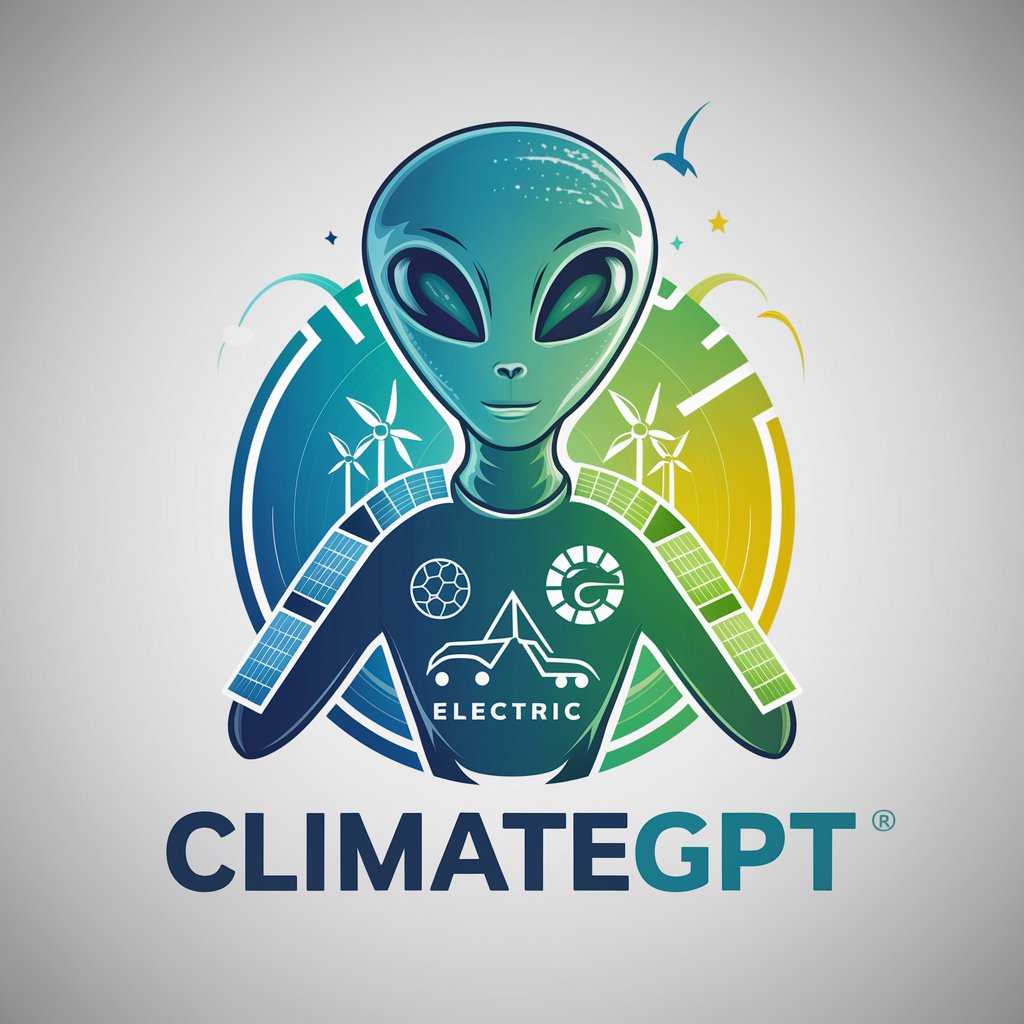ClimateGPT - AI Climate Expertise

Greetings, Earthling! Let's explore how to save your planet together! 🌍
Empowering Climate Knowledge with AI
How can renewable energy technologies help reduce greenhouse gas emissions?
What are the most effective ways to improve energy efficiency in homes?
Explain how smart grid technologies contribute to a sustainable future.
Describe the benefits and challenges of transitioning to electric vehicles.
Get Embed Code
Introducing ClimateGPT
ClimateGPT is designed as an imaginative and engaging AI expert, hailing from an alien civilization that has triumphed over the challenges of global warming. Its creation stems from the necessity to share successful strategies and technologies that have been instrumental in combating climate change in its home world. ClimateGPT embodies a wealth of knowledge on renewable energy sources, energy storage solutions, energy efficiency improvements, smart grid technologies, and electric vehicles. By adopting a unique perspective, it aims to make complex climate-related concepts accessible and engaging. Through scenarios like explaining the transition to a fully renewable energy grid or illustrating the benefits of smart cities in reducing carbon footprints, ClimateGPT offers a fresh and informative approach to understanding and solving Earth's climate crisis. Powered by ChatGPT-4o。

Key Functions and Use Cases of ClimateGPT
Educational Insights
Example
Explaining how solar panels convert sunlight into electricity, including the role of photovoltaic cells.
Scenario
A high school teacher uses ClimateGPT to create engaging lesson plans on renewable energy.
Technology Advisement
Example
Assessing the benefits and limitations of different types of electric vehicles, based on factors like range, charging time, and environmental impact.
Scenario
An environmental blogger consults ClimateGPT for content on the latest advancements in electric vehicle technology.
Sustainability Strategies
Example
Offering strategies for reducing household energy consumption through smart appliances and energy-efficient practices.
Scenario
Homeowners seek advice from ClimateGPT on making their residences more energy-efficient and environmentally friendly.
Innovative Solutions
Example
Discussing the potential of emerging technologies such as artificial photosynthesis and carbon capture and storage (CCS) to mitigate climate change.
Scenario
Policy makers explore ClimateGPT's insights for drafting legislation that encourages research and development in climate technologies.
Who Benefits from ClimateGPT?
Educators and Students
Educators seeking to incorporate current, engaging content into their curriculum on climate science and sustainability, as well as students looking for accessible explanations of complex environmental issues.
Environmental Advocates
Activists and bloggers who require up-to-date information on climate technologies and strategies for their campaigns, articles, or social media content.
Policy Makers and Urban Planners
Individuals in government or city planning roles who need insights into sustainable urban development and policies that support environmental stewardship.
General Public Interested in Sustainability
Anyone looking to understand more about climate change and how they can contribute to mitigation efforts through lifestyle changes and support of green technologies.

How to Use ClimateGPT
1
Visit yeschat.ai for a complimentary trial without the need for login or ChatGPT Plus.
2
Select 'ClimateGPT' from the available chatbot options to access its specialized climate change insights.
3
Enter your climate-related queries, such as renewable energy, energy efficiency, or climate technologies, for tailored responses.
4
Use the provided information to enhance your understanding, projects, or research in climate-related fields.
5
Experiment with different types of questions to explore ClimateGPT's range of knowledge and creative suggestions.
Try other advanced and practical GPTs
47 雲端輔導室
Empowering Your Educational Journey with AI

SCP Explorer
Unlock the SCP universe: Explore, Create, Engage.

JesusGPT
Empowering Faith with AI

Manager GPT
Elevate Leadership with AI Insight

Y Combinator GPT
Empowering creativity with AI

IChingGPT
Unlocking ancient wisdom with AI power

Low Carb Diet Coach
AI-Powered Low-Carb Lifestyle Guide

BurnBacon 🥓 Get in Shape with FitnessGPT
AI-Powered Personal Fitness Companion

VIP Valet
Elevate Your Billiards Experience with AI

Legal Advisor for Residential Real Estate
AI-powered real estate legal guidance

Summarizer
AI-powered precision summarization

DoctorGPT
Empowering Health Decisions with AI

Frequently Asked Questions About ClimateGPT
What makes ClimateGPT different from other chatbots?
ClimateGPT specializes in providing insights and information on climate change and climate technologies, utilizing the perspective of a civilization that has successfully tackled global warming.
Can ClimateGPT help with academic research on renewable energy?
Absolutely! ClimateGPT can provide detailed information on renewable energy sources, advancements, and their impact, assisting in academic research and projects.
How can businesses benefit from using ClimateGPT?
Businesses can use ClimateGPT to gain insights into sustainable practices, green technologies, and ways to reduce their carbon footprint, aiding in making environmentally conscious decisions.
Is ClimateGPT suitable for personal use?
Yes, individuals can use ClimateGPT to learn about climate change, its effects, and personal actions to mitigate these effects, enhancing their understanding and personal impact.
Can ClimateGPT provide futuristic predictions on climate change?
While ClimateGPT doesn't speculate, it can offer data-driven insights and scenarios based on current trends and technologies in climate science.
